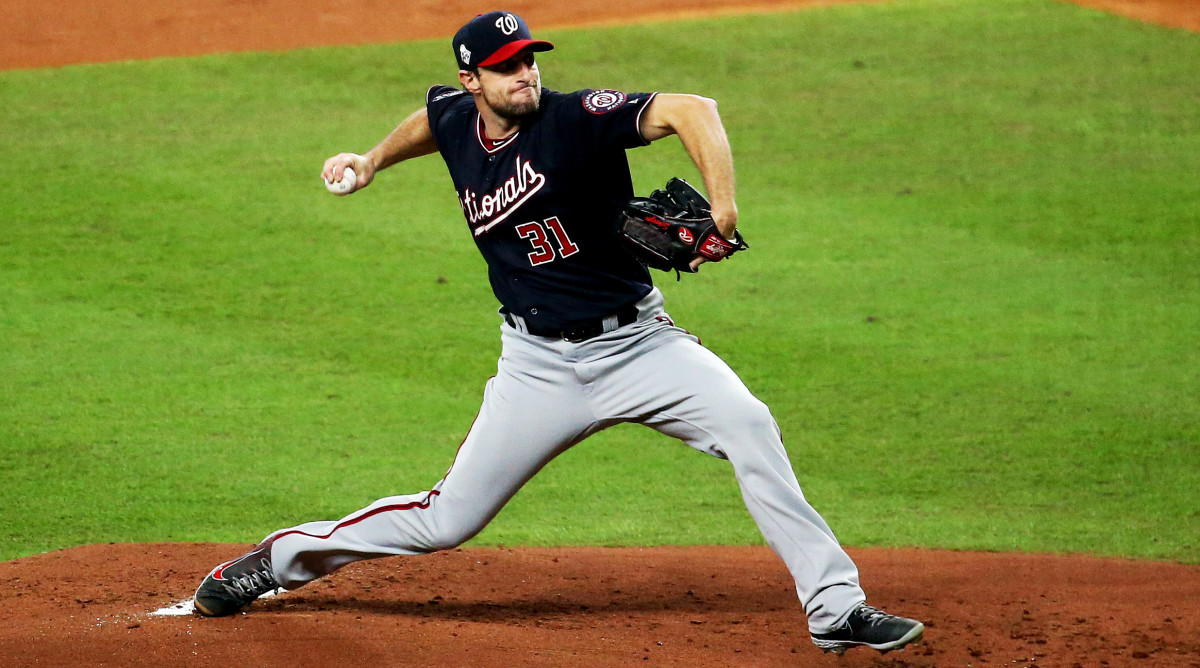Max Scherzer Grinds Through Five Innings to Win Nationals' First World Series Game


HOUSTON — Each time he drags himself from a warm bed and laces his sneakers, each time he orders a salad, each time he turns down an invitation, Max Scherzer thinks about the number 15. Each time the coaching staff assigns him a number of sprints and he doubles it, or a number of squats and he adds two, he thinks of a moment like this: the Nationals, in position to steal Game 1 of the World Series, and their ace, with the three most important outs of the season awaiting him, summoning the strength to snatch them.
“You need to be at your best deep in the ballgame, when it matters,” Scherzer said after it was over, after Washington beat the Astros 5–4 for the first World Series victory in Nationals franchise history. “So much of the time the game is decided in your last 15 pitches, whether you’re gonna win or lose a ballgame.”
He was wearing a black T-shirt emblazoned with the Nats’ motto, STAY IN THE FIGHT. The words seemed especially appropriate on Tuesday, as the heaviest World Series underdogs in a dozen years toppled the best team in baseball. And it all started with Scherzer.
Facing Houston ace Gerrit Cole, who hadn’t lost a start since May 22, the Nationals knew they needed a sparkling outing from Scherzer. They didn’t get it. The Astros made him work from the first inning, when George Springer drew a leadoff walk. He allowed two runs and threw 26 pitches.
He labored through a 22-pitch second and a 21-pitch third. The Washington coaching staff began doing the math.
MAD MAX!
— FOX Sports: MLB (@MLBONFOX) October 23, 2019
Scherzer gets out of the jam to keep it a 1-run game. pic.twitter.com/UxdjatInnr
The team insists that it believes in every member of its roster, but the truth is that the Nats employ approximately three reliable relievers: Daniel Hudson and Sean Doolittle, who have traded closing duties, and Tanner Rainey. The Astros adapt to pitchers better than perhaps any other team in baseball, so the Nationals need to limit their lesser hurlers’ exposure or risk a collapse late in the series. They already planned to use Patrick Corbin, scheduled to start either Game 3 or 4, for one frame—preferably a clean one. Doolittle, Hudson and Rainey might combine for three. If, as seemed increasingly likely, Scherzer could not make it through the fifth inning, Martinez would be forced to call upon one of his middle relievers.
Scherzer escaped the fourth inning, with the game tied at 2, at 95 pitches. The Nationals scored three times in the top of the fifth.
In the dugout, players began discussing the plan. We need to get him through another one, they decided. The coaches settled on a contingency plan: They would let Scherzer start the inning. If he struggled, they could bring Corbin in early, with men on base, and ask him to throw two innings. That would affect his availability to start later in the series. But they had to use their most effective pitchers: If you take the lead against Cole, you must win the game.
Scherzer stalked to the mound. He strutted around the dirt. He grunted. And almost simultaneously, GM Mike Rizzo and pitching coach Paul Menhart relaxed.
Here he goes, Rizzo thought.
The last 15, Menhart thought.
Scherzer had allowed at least one baserunner in each inning. He spent most of the night pitching from the stretch, costing him the ability to settle into a rhythm and to locate his fastball. He generally relies on fooling hitters into flailing at pitches outside the strike zone; on Tuesday the Astros chased only eight balls. The result was an exhausted man who just wanted to avoid catastrophe. He aimed low in the zone, bouncing balls in the dirt rather than leave a juicy pitch in the center of the plate.
“If I had to walk somebody, I had to walk somebody,” he said. “I just couldn’t make any more mistakes tonight.”
He knew he had reached his last 15. He reared back. Michael Brantley lined out. Alex Bregman grounded to shortstop. Yuli Gurriel struck out swinging. Scherzer pounded his glove and returned to the dugout.
He had gotten through the fifth. He had, as it turned out, allowed them to go from Corbin to Rainey to Hudson to Doolittle. He had, perhaps, put the Nats on course to win the World Series. He had thrown 17 pitches.
